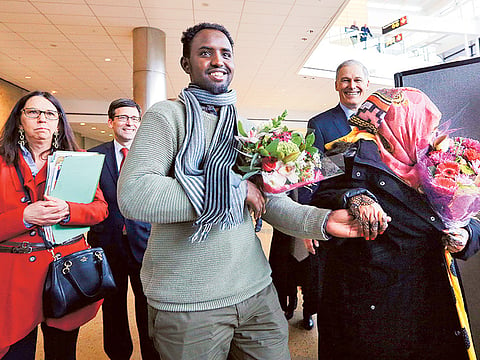US court to hear arguments on Trump’s travel ban
Trump administration defends ‘lawful’ travel ban

San Francisco/Washington: A US federal appeals court will hear arguments on Tuesday over whether to restore President Donald Trump’s temporary travel ban on people from seven Muslim-majority countries, the most controversial policy of his two-week old administration.
The US government on Monday defended President Donald Trump’s travel ban as a “lawful exercise” of his authority, and urged an appeals court to reinstate the suspended measure in the interests of national security.
In a brief filed on Monday, the Justice Department said last week’s suspension of Trump’s order by a federal judge was too broad and “at most” should be limited to people who were already granted entry to the country and were temporarily abroad, or to those who want to leave and return to the United States.
The Justice Department argued that “the executive order is a lawful exercise of the president’s authority over the entry of aliens into the United States and the admission of refugees.”
“Even if some relief were appropriate, the court’s sweeping nationwide injunction is vastly overbroad,” it said.
The government again denied that the order specifically targets Muslims, defending it as a means of reviewing and revising screening procedures in order to “protect against terrorist attacks.”
That language did not appear in the government’s opening brief filed at the 9th US Circuit Court of Appeals, and could represent a softening of its position.
Last Friday’s ruling by US District Judge James Robart in Seattle suspending the travel ban opened a window for people from the seven affected countries to enter.
The 9th Circuit in San Francisco on Monday asked lawyers for the states of Washington and Minnesota and the Justice Department to argue whether the ban should remain shelved. The court set oral argument for 3pm PST (2300 GMT) on Tuesday.
Two new polls show a majority of Americans now oppose the travel ban on refugees and travellers from seven mostly-Muslim nations, which prompted airport chaos and condemnation around the world — but Trump has shown no sign of bending, pushing back late Monday in a new Twitter salvo.
“The threat from radical Islamic terrorism is very real, just look at what is happening in Europe and the Middle-East. Courts must act fast!” he wrote.
In its filing to the Ninth Circuit Court of Appeals in San Francisco, the government argued that the federal court that temporarily rolled back Trump’s directive had “erred in entering an injunction barring enforcement of the order,” asking that the ban be reinstated.
Opponents say the 90-day ban is illegal, barring entry for citizens from Iran, Iraq, Libya, Somalia, Sudan, Syria and Yemen and imposing a 120-day halt to all refugees.
“President Trump’s executive order is unconstitutional, unlawful, and fundamentally un-American — and we won’t stand by while it undermines our states’ families, economies, and institutions,” said New York Democratic Attorney General Eric Schneiderman.
National security veterans, major US technology companies and law enforcement officials from more than a dozen states backed a legal effort against the ban.
The case may ultimately reach the US Supreme Court.
Ten former US national security and foreign policy officials, who served under both Republican and Democratic presidents, filed a declaration in the court case arguing that the travel ban served no national security purposes.
It was signed by former Secretaries of State John Kerry and Madeleine Albright, former national security adviser Susan Rice and former CIA Directors Michael Hayden and Michael Morell.
Over the weekend, the San Francisco court denied the administration’s request for an immediate suspension of the federal judge’s temporary restraining order that blocked the implementation of key parts of the travel ban while it considered the government’s request in full.
The court did say it would consider the government’s request after receiving more information.
Trump has reacted to challenges to the ban by attacking the federal judge in Seattle and then the wider court system.
Trump faces an uphill battle in the San Francisco court, which is dominated by liberal-leaning judges. Appeals courts are generally leery of upending the status quo, which in this case is the lower court’s suspension of the ban.
The appeals court was focusing on the narrow question of whether the district court had grounds to put the order on hold.
The bigger legal fight over whether Trump had authority to issue the order will be addressed later in the litigation.
Curbing entry to the United States as a national security measure was a central premise of Trump’s campaign, originally proposed as a temporary ban on all Muslims.
US presidents have in the past claimed sweeping powers to fight terrorism, but individuals, states and civil rights groups challenging the ban said his administration had offered no evidence it answered a threat.
Sign up for the Daily Briefing
Get the latest news and updates straight to your inbox



